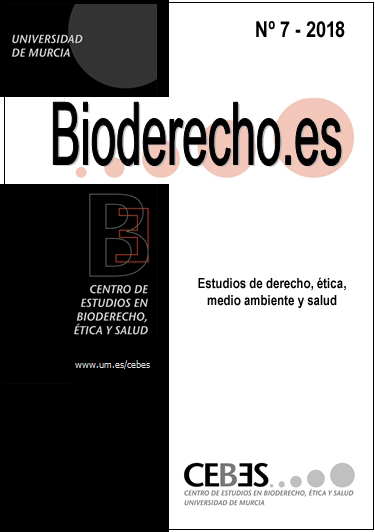Right not to know and therapeutic privilege on minors concerning genetic diseases
Abstract
We intend to analyse the legal institutions of “therapeutic privilege” and “right not to know”, restricted to genetic diseases and minor patients. In order to achieve this, we will consider, beyond the law regarding informed consent (Law 41/2002), the most recent changes concerning minors and their clinical data.
The adoption of the Organic Law 8/2015, 22nd July, on amendment of the protection system for childhood and adolescence; and Law 26/2015, 28th July, with the same name; increases the minors autonomy and also strengthen the “best interest of the child”. Besides, the application of the “General Data Protection Regulation”; and Organic Law 3/2018, 5th December, of Personal Data Protection and guarantee of digital rights, reinforces the informational self-determination, regarding both patients and minors.
The analysis of these two institutions and their influence in the context of clinical information will guide us in dealing with eventual conflicts among minors rights and the safeguards of their legal representatives.
Downloads
-
Abstract596
-
PDF (Español (España))2238
References
ANDORNO, R. “The Right Not to Know: An Autonomy Based Approach”, enJournal of Medical Ethics30.5(2004), pp.435–439.
ARCOS VIEIRA,M.L."Consentimiento no informado: reflexiones en torno a la existencia de un "derecho a no saber" aplicado a la información clínica",en Autonomía del paciente e intereses de terceros: Límites. Dir. María Luisa Arcos Vieira. Navarra: Thomson Reuters Aranzadi, (2016), pp. 23-67.
COLE,C.M.,YKODISH, E. “Minors’ Right toKnow and Therapeutic Privilege”,en Virtual Mentor 15.8 (2013), pp. 638–644.
EMALDI CIRIÓN, A. "Dilemas jurídicos enel proceso de consejo genético." El consejo genético y sus implicaciones jurídicas. Bilbao–Granada: Ed. Comares, (2001), pp.177.
GÓMEZ SÁNCHEZ, Y. “La Protección de Los Datos Genéticos: El Derecho a La Autodeterminación Informativa”, enDS: Derecho y salud16.1 (2008), pp.59–78.
O'CALLAGHAN MUÑOZ, X. "Interpretación de las normas jurídicas." Compendio de Derecho Civil. Tomo I. Parte General. Madrid: Editorial Universitaria Ramón Areces,(2012), pp.93.
PARKER:BORTOLOTTI, L., y WIDDOWS, H. “The Right Not to Know: TheCase of Psychiatric Disorders”, enJournal of medical ethics37.11 (2011), pp-673–676.
SANCHO GARGALLO, I. “Tratamiento legal y jurisprudencial del consentimiento informado." InDret2 (2004), pp.18.
TOWSEND, A. et al. “Autonomy and the Patient’s Right ‘not to Know’ inClinical Whole-Genomic Sequencing”, enEuropean Journal of Human Genetics22.1 (2014), pp. 6.
Los autores que publican en esta revista están de acuerdo con los siguientes términos:
- Los autores conservan los derechos de autor y garantizan a la revista el derecho de ser la primera publicación del trabajo, con la obra disponible simultáneamente bajo una licencia Creative Commons Atribución-Compartir Igual 4.0 Internacional (CC BY-SA 4.0), que permite a otros copiar y redistribuir la obra en cualquier medio o formato, remezclar, transformar y construir a partir de la obra para cualquier propósito, incluso comercialmente, siempre que: a) se reconozca la autoría y publicación inicial en esta revista; b) se indiquen los cambios realizados; y c) si se transforma o crea a partir de la obra, se distribuya la contribución bajo la misma licencia CC BY-SA 4.0.
- Los autores pueden establecer por separado acuerdos adicionales para la distribución no exclusiva de la versión de la obra publicada en la revista (por ejemplo, situarlo en un repositorio institucional o publicarlo en un libro), con un reconocimiento de su publicación inicial en esta revista.
- Se permite y se anima a los autores a difundir sus trabajos electrónicamente (por ejemplo, en repositorios institucionales o en su propio sitio web) antes y durante el proceso de envío, ya que puede dar lugar a intercambios productivos, así como a una citación más temprana y mayor de los trabajos publicados (Véase The Effect of Open Access) (en inglés).



